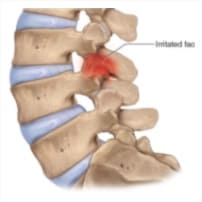Facet Joint Syndrome
Facet Joint Syndrome is a problem with movement of the facet joints of the spine. If one of the joints becomes stiff or too mobile then inflammation and pain is often the result. The facet joints are delicate structures that form the links between the vertebrae of the spine rather like the links of a bicycle chain.
What causes facet joint syndrome?
Usually the cause of facet joint pain is trauma. This can be a single major trauma, like a car accident or a fall, or a repetitive minor trauma caused by, for instance, poor posture, bad lifting or even long periods sitting down.
The core stability muscles of the back and abdomen may also have become weak, perhaps by lack of exercise. These deep muscles protect the spine during normal movement and act like shock absorbers. If they are not doing their job then this may lead to the spinal joint dysfunction and pain.
Our genetics may also play a role. If our spine is not perfectly formed or is slightly twisted then subtle stresses put more pressure on the back joints and may lead to facet strain and cause pain. Sometimes the discs of the spine may not be as healthy as they should be and this can put extra loading on the facet joints too.
Spinal facet joint problems can also be aggravated by stress. The reason this happens is not clear but may be due to more inflammatory chemicals flowing round the body at times of stress, especially if it is prolonged stress. It also possible that pain perception in the brain may is altered in chronic stress leading to a worsening of the pain from the spine.
What are the symptoms of Facet Joint Syndrome?
Back pain and neck pain are the commonest symptoms of facet joint syndrome. Most facet joint problems are completely pain free until things get bad enough to cause inflammation and pain. This can be triggered by even normal movements, like bending over to pick something up, turning round in the car or reaching into a cupboard.
Sometimes the nerves in the facet joint can be irritated by joint dysfunction. This can cause alarm signals firing off into the spinal cord and brain. When this happens, changes in muscle function can occur in the area of the spinal dysfunction and in the arm or leg supplied by nerves that come from that area. This can cause muscle spasm or muscle
weakness. Other nerves can also be affected leading to leg or arm pain and even headaches.
If the facet joint dysfunction is left unattended then scar tissue can form in and around the joint which causes more dysfunction and nerve irritation. It may accelerate degenerative arthritis as well although this is not thought to increase the incidence of back or neck pain.
Facet Syndrome is thought to be a mostly silent condition unless the tissues involved get too irritated, that’s when symptoms can start. It is also thought to get worse as time goes on if left unattended. Early assessment and treatment if necessary is recommended.
Facet Joint Syndrome Treatment
Facet Joint Syndrome is commonly treated by chiropractors. Chiropractors treatment of Facet Syndrome is directed at the dysfunctional joints causing the pain. If the joints are too stiff and have become locked then treatment is provided to unlock them. This is
done manually using a gentle but precise manipulation of the exact joint involved in the exact direction it needs to move. These adjustments increase the flexibility of the joint by breaking down the scar tissue or fibrosis and reducing the irritation of the nerves around it. This allows the joint to heal and normal function to return.
Several sessions of treatment are usually required to restore full function to the joints and to allow the muscles and ligaments to heal properly. We will tell you how many sessions are likely which will depend on several factors like how long you have had the problem, (which may be for longer than you have had the pain), your age and activity levels, your occupation and lifestyle, as well as how frequently you are treated. People usually respond best to more frequent sessions initially and then increasing the gap between sessions as you improve. There is some evidence that periodic check-ups may help prevent recurrence too.
Common Complaints
Patients consult us with the following common complaints.
Clinic Information
Book an Appointment
Call Us On
63 Reinwood Road
Huddersfield
HD3 4DH
See our Clinic Fees






